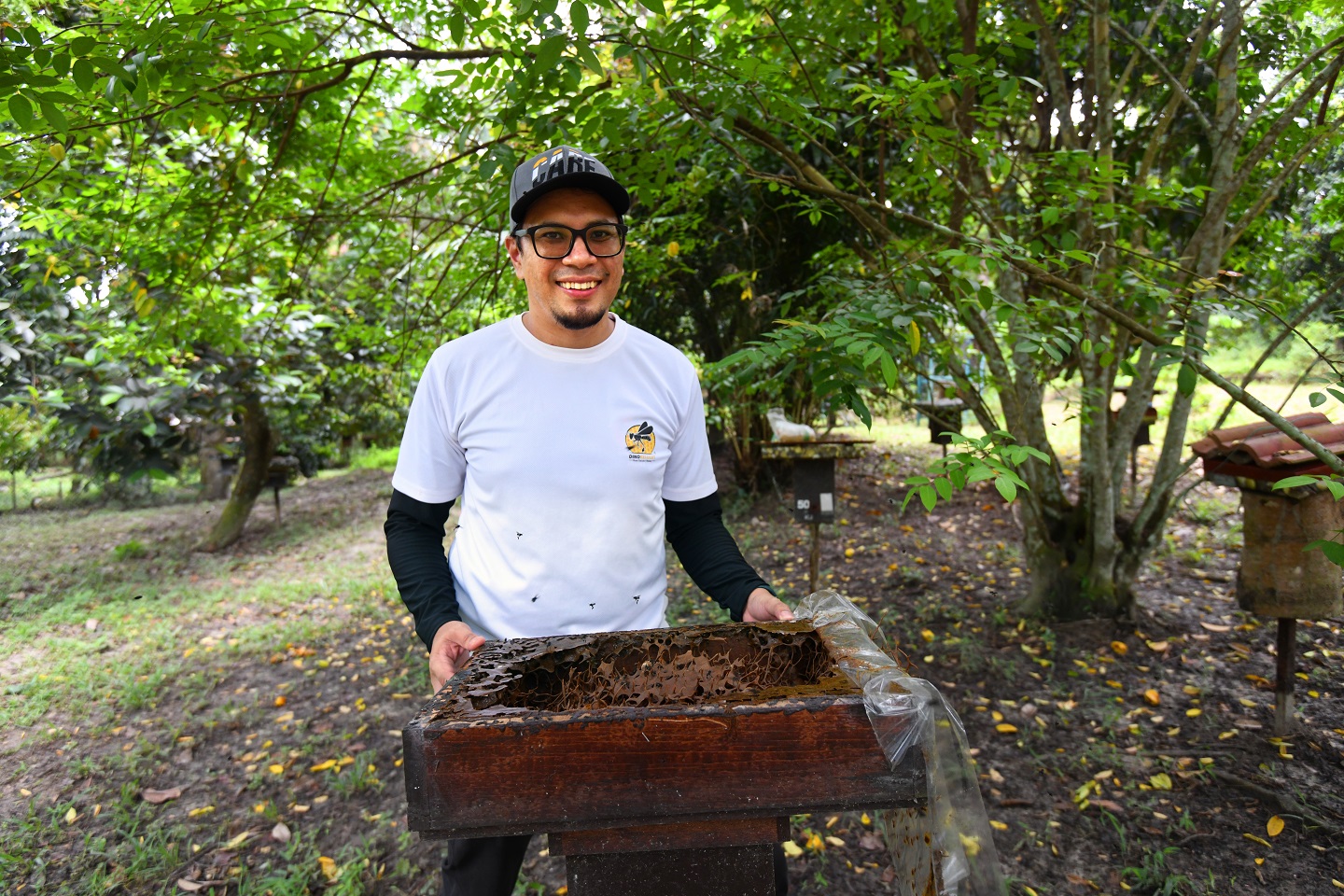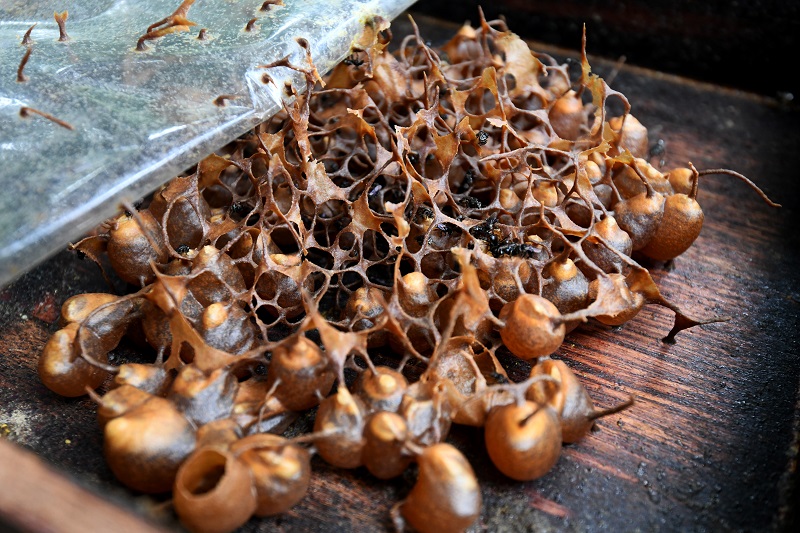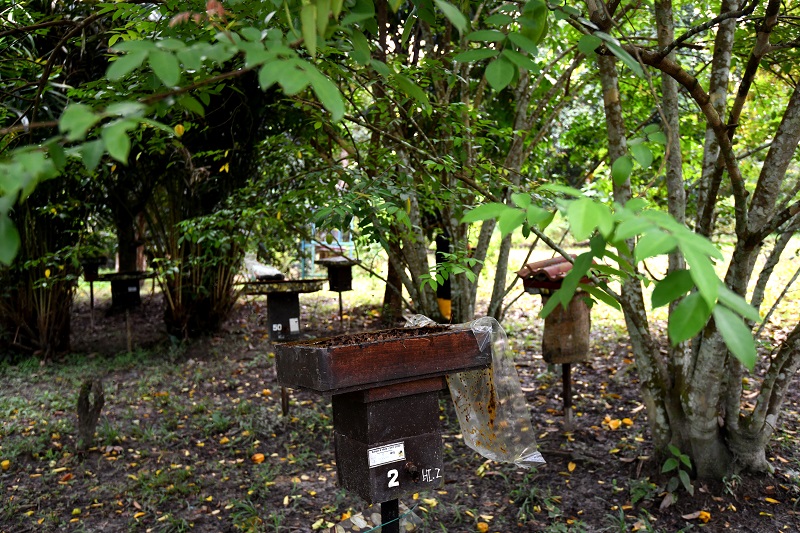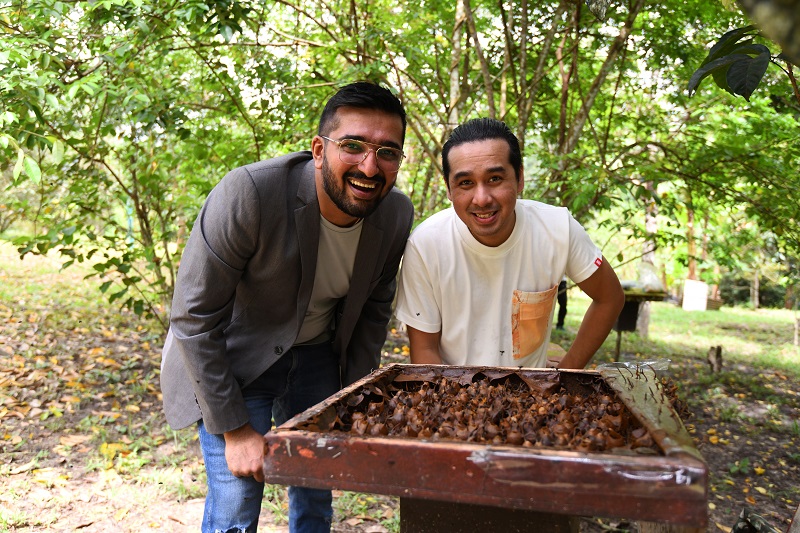
Dino: When I started off , I didn’t expect to do this full time. Eventually, the passion grew. (All photos: Low Yen Yeing/ The Edge Malaysia)
After losing someone close to him to cancer at the age of 23, Azril Dino Abd Malik was struck by the thought of his own mortality. Research into ways to improve his health led him straight to honey.
“That’s why I started to take Australian honey every morning, and then an article came out in which [a brand] admitted that its honey was adulterated,” he says. About 80% of honey found in the market are reportedly fake or synthetic.
Stunned, Dino wondered how he could get his hands on the real deal. He happened upon a company that offered a Kelulut stingless bee profit-sharing programme, and was excited to invest. At the time, Dino was a system support analyst at IBM, where he spent 13 years, and thought the passive income as well as free honey from the programme would be an added bonus. Unfortunately, he got scammed, and instead of getting large profits every month, Dino was short-changed for two years. To make matters worse, he was retrenched from IBM.
“My wife and I sat down, and she said, ‘You already have your bee colonies over there, why don’t you just focus full time on it?’”
And so he did. The initial years were certainly an uphill battle. First, as Dino was based in Kota Damansara in Petaling Jaya, he had to travel almost two hours every day to the farm in Kuala Pilah, Negeri Sembilan. There was also so much to learn about this variety of bees. Trigona honey, also known as madu kelulut, is made by stingless bees, which are slightly different from their better-known stinging cousins.
20221006_lei_save_the_bees_with_bar_trigona_7_lyy.jpg

“Everybody knows about the stinging bees and how they store honey in honeycombs. Stingless bees store it in propolis pods. That is the difference. The bees go out and find resin from the trees to make the propolis pods, which have antimicrobial and anti-cancer properties. Then they find nectar from flowers and fill up the pods. When the pod is full, they seal it up. We leave it for 30 to 40 days so all the propolis properties are infused with the honey. That’s why this honey is actually like 10 times more beneficial than regular honey.”
Kelulut honey is said to have numerous health benefits. As the bees are smaller than their stinging counterparts, they are able to go deeper into flowers and get more nutrients from them. Scientists have also found that unlike most varieties, it contains trehalulose, a type of sugar that Dino says does not spike levels in our body, but rather balances it out. He recommends consuming a spoonful of honey 30 minutes before food in the morning or once every night.
“It is best taken right before you go to sleep. When we sleep, our body actually heals naturally, so if you take one spoonful before bed, the healing process multiplies, it goes beast mode,” he adds.
Knowing about the benefits of the honey was one thing, producing and harvesting was another. “I went to all sorts of courses organised by private companies as well as government agencies. I went from zero to at least some sort of knowledge. We knew all the theory but when you’re on the farm, it’s different, it’s the practical [aspect]. We had to bring theory and practical together.”
Learning from research that one colony can produce from 500 grams to a kilo of honey, Dino had great hopes for his 300 colonies. However, this fact did not take environmental concerns such as food source and weather into consideration. He and his team had to study the bees, even at night, to learn their ways and what works best for them.
The Trigona bees develop their hives in tree trunks, which posed another problem. “In order for us to get a colony, in the beginning, we needed to chop down trees. As I started with 300 colonies, I was responsible for 300 trees being chopped down.”
20221006_lei_save_the_bees_with_bar_trigona_38_lyy.jpg

The axed log will eventually decay, forcing the bees to either relocate or die. Keeping the hive inside the log also limits the amount of control beekeepers have when faced with a complication. For instance, Dino tells us about a company which imported beehives from Thailand that eventually became infested with a type of maggot called the black soldier fly. At a loss for what to do, staff ended up burning all the affected colonies for fear the maggots might spread.
Dino eventually developed the Technohive, which means fewer trees are harmed and beekeepers have more control over the colonies. For instance, if one hive is quite weak, they can import soldiers from a stronger hive, or if a queen is missing, they can find a new one. The Technohive gives the team easy access to the bees for harvesting as well as to check up on their progress in a non-invasive way.
“When I started off, I didn’t expect to do this full time. Eventually, the passion grew. I initially didn’t want to sell, but people kept asking to taste our honey.”
And so Dino Kelulut was born, a brand with the aim of being the largest, high-quality, healthy and premium Kelulut honey producer throughout Asia.
In 2018 Dino Kelulut was approached by Four Seasons Hotel Kuala Lumpur for their aptly named Bar Trigona. “They were looking for something Malaysian and unique. They were trying to source real honey and were impressed with what they saw. We are really grateful because they actually helped to introduce a lot of tourists to our honey, which is great because this is like a Malaysian treasure, our national treasure,” adds Dino.
This partnership also raised awareness of stingless bees to locals, many of whom are surprised that they exist. Dino Kelulut has since expanded its farms widely.
20221006_lei_save_the_bees_with_bar_trigona_46_lyy.jpg

In 2019, Bar Trigona launched the “Save the Bees” programme to help sustain the bees and biodiversity. Under this initiative guests are invited to adopt a beehive at Dino’s Kelulut Organic Farm for RM500 a year. In return, patrons will receive a bottle of bee propolis, six jars of artisanal Trigona honey, a personalised adoption certificate, as well as quarterly updates on the progress of the busy bees. As these buzzing creatures are responsible for pollinating about 80% of the world’s fruits and vegetables, and are integral to our survival, this initiative will encourage natural beekeeping methods and help sustain the environment.
With the help of Bar Trigona, we had the opportunity to visit one of the Dino Kelulut production farms in Negeri Sembilan. Located behind a few unassuming houses — without any signage as there is a tendency for colonies to be stolen and sold for profit — there are five acres of land that hold about 100 Technohives. Assistant bar manager Julian Benjamin Brigget and newly appointed bar manager Rohan Matmary joined us on this excursion, as Dino explained how the Technohives work and told us about the different species on the farm.
Another unique quality of the Kelulut honey is that it has a sour taste with a sweet finish. These stingless bees are multifloral, meaning that they have a variety of food sources. As such the species and location of each hive would determine the flavour profile of the honey.
In Brazil, the same Trigona species is said to produce an intensely sweet product, whereas the Malaysian counterpart has a layered, more acidic flavour. Hives placed near a star fruit or rambutan tree are more influenced by its flavour than those further away, and as these plants are seasonal, the taste of the honey changes accordingly. The extra small species of Trigona bees, which can crawl even deeper into flowers, have sweeter honey than most but Dino notes that they also produce a much smaller yield.
There are many shortcuts in the beekeeping business, which often affect the quality golden nectar. Some feed the bees sugar water to ensure that they do not have to travel far, but we learnt that bees too can get diabetes, and this also affects the health properties of their honey. Other beekeepers dilute or flavour the nectar in the propolis pods so when guests come to taste the honey, it ends up tasting “perfectly” sweet. There are also farms that immediately harvest the honey once the pods are full, instead of waiting for the recommended 40 days, which leads to an instant reduction in quality. While aware of these tricks, Dino is adamant about upholding the quality of the honey he produces as many customers have returned to applaud the benefits they have reaped, from better digestion to their overall health.
20221006_lei_save_the_bees_with_bar_trigona_21_lyy.jpg

Dino has worked hard at developing technology that will improve his business and beekeeping in general. With a grant from Sirim Bhd, he created a prototype for a device that can measure the amount of honey collected during harvesting to prevent any going missing. The data collected is also directly uploaded to a cloud server for convenience.
Initially, honey from Dino Kelulut had to be refrigerated at all times. “Our honey is hygroscopic and so it takes in moisture from its surroundings. Malaysia is very humid, so a lot of moisture goes into the honey. That’s why it’s more liquid and very watery,” he says.
This honey also continues to ferment if it is not refrigerated, and keeping bottles in warm spaces can lead to unexpected explosions (which has happened more than once). “We did not want to reduce the water level earlier because the only way to do it was to apply heat to the honey. This will affect the honey — it won’t maintain the natural state and health benefits,” Dino adds.
Working with Sirim again, they developed a kind of ceramic dehumidifier to remove the water content from the honey, halting the fermentation process and so making it safe to keep it at room temperature. Now, Dino Kelulut can begin exporting its honey and Bar Trigona guests can travel with their bottles safely.
Dino is focused on education just as much as he is on the business side of things. He hopes people will be more aware of the hard work that goes into beekeeping as well as the numerous advantages bees have on the environment and the positive impact of consuming kelulut honey.
“Now, we work with local universities to research the use of this honey and why it is so good. Because it’s already Malaysia’s first superfood, we want to see how we can maintain the quality and eventually make it a commodity in 2030, like rubber and palm oil.”
For more information or to adopt a beehive, see here or call (03) 2382 8888.
This article first appeared on Oct 24, 2022 in The Edge Malaysia.


